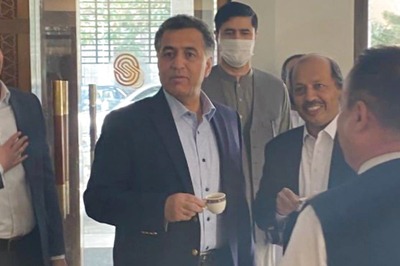
views
Beijing: China's former railways minister Liu Zhijun was given a suspended death sentence on Monday that will likely be commuted to life imprisonment for bribery and abuse of power in one of the country's highest-profile corruption cases in years. Liu's sentence is seen as lenient in a country where the death penalty is meted out even for economic crimes like tax evasion, and likely reflects the Communist Party leadership's desire to not antagonize ruling party factions that might face similar charges.
The official Xinhua News Agency said Liu was sentenced to death with a two-year reprieve by Beijing No 2 Intermediate People's Court. After two years, such sentences typically are commuted to life in prison if the inmate shows good behavior.
"If they were to sentence Liu Zhijun to death now, that generates expectations in the minds of officials and the people that officials of similar seniority will have to be executed," said Willy Lam, a professor at Chinese University of Hong Kong. "The party leadership is reluctant to set up these kinds of expectations because there are so many corrupt officials who might have really sterling, good political connections."
Liu, 60, who oversaw the ministry's high-profile bullet train development, was accused of taking massive bribes and steering lucrative projects to associates. New Chinese leader Xi Jinping has made fighting corruption a hallmark campaign of his term in office so far.
Though Liu was arrested and investigated before Xi came to power, the public is still likely to view his sentence as undermining Xi's pledge to treat both high- and low-level corrupt officials with equal severity. It also feeds public perception of a judicial system that protects those with powerful political connections while severely punishing ordinary people.
"The public reaction is going to be one of strong resentment, because some cases are very clear, when ordinary people commit minor economic crimes, they get heavy sentences," said Zhang Ming, a China politics expert at Renmin University in Beijing. "When you compare this to those cases, you can see that justice is unfair."
"They might as well abolish the death penalty. If they don't do that but they only sentence ordinary people to it and never high-level officials, then there is a problem," Zhang said. The court found Liu guilty of using his position of influence to help about 11 business associates win promotions and project contracts and accepting 64.6 million Chinese yuan ($10.5 million) in unspecified bribes between 1986 and 2011.
State broadcaster CCTV showed footage of Liu, a thin, bespectacled man in a grey, zippered jacket and matching pants, standing with his hands at his side in a courtroom during the sentencing, his face void of expression.
The court sentenced Liu to 10 years' imprisonment for the crime of abuse of power and also ordered the confiscation of all of Liu's personal property, Xinhua reported. Liu's lawyer Qian Lieyang said his client would likely not appeal the sentence. Qian refused comment further on the case.
Xinhua said Liu should have been given the death penalty for the crime of bribery, "which violated the integrity of a state official's duty behavior and undermined the state functionary's reputation" but that the court granted him a reprieve because he admitted guilt and showed repentance.
The report quoted the judge who ruled in the case, Bai Shanyun, as saying that Liu had cooperated with the investigations, told the truth about crimes that he committed, offered information on cases that the authorities had not known about and helped recover a large part of the misused funds, the report said.
Liu was ousted in February 2011 for unspecified discipline violations. Months later, a high-speed train crash killed 40 people near the eastern Chinese city of Wenzhou. Earlier this year, Beijing dismantled the Ministry of Railways and separated its regulatory and commercial arms in a bid to reduce bureaucracy and boost efficiency.

















Comments
0 comment